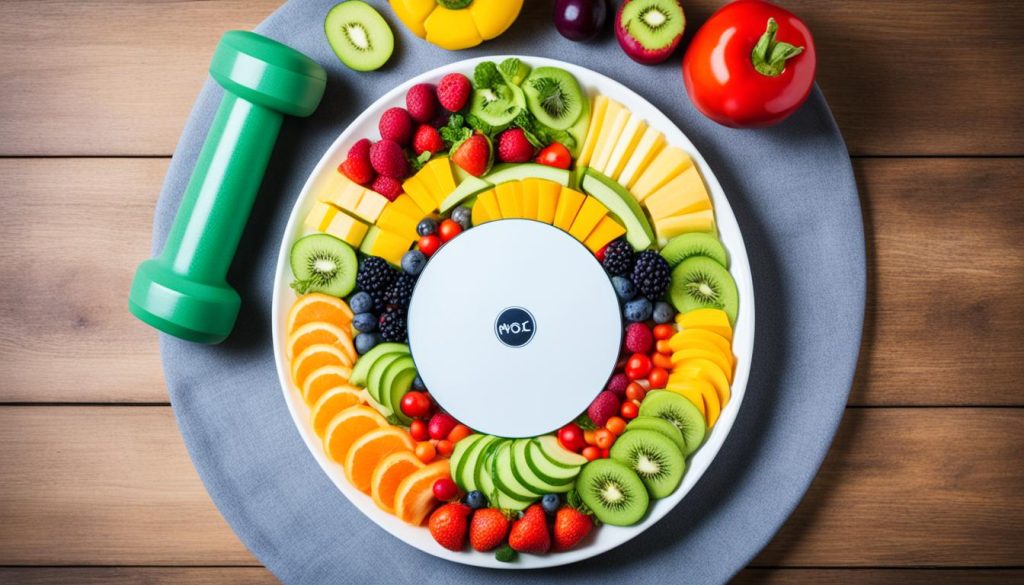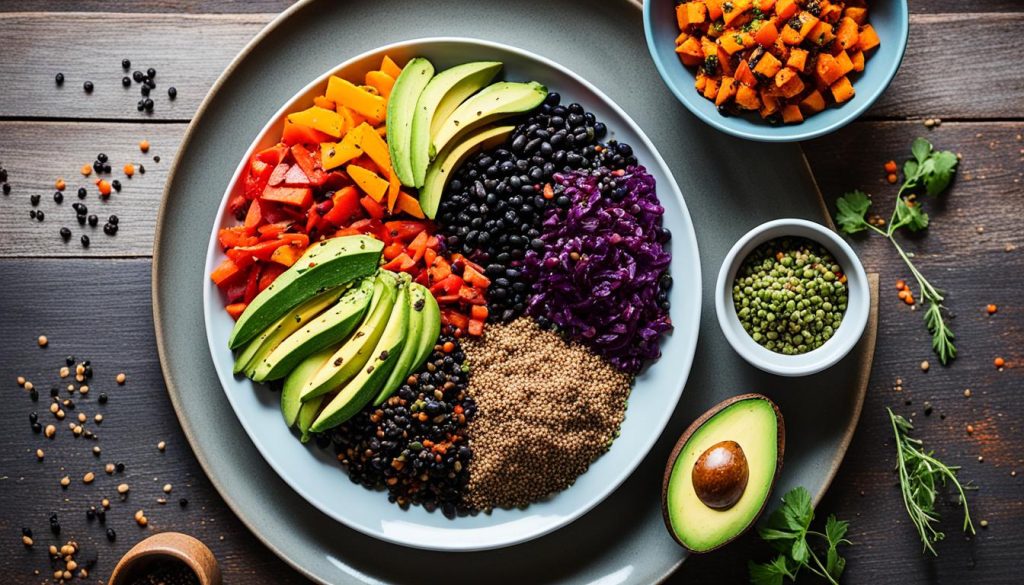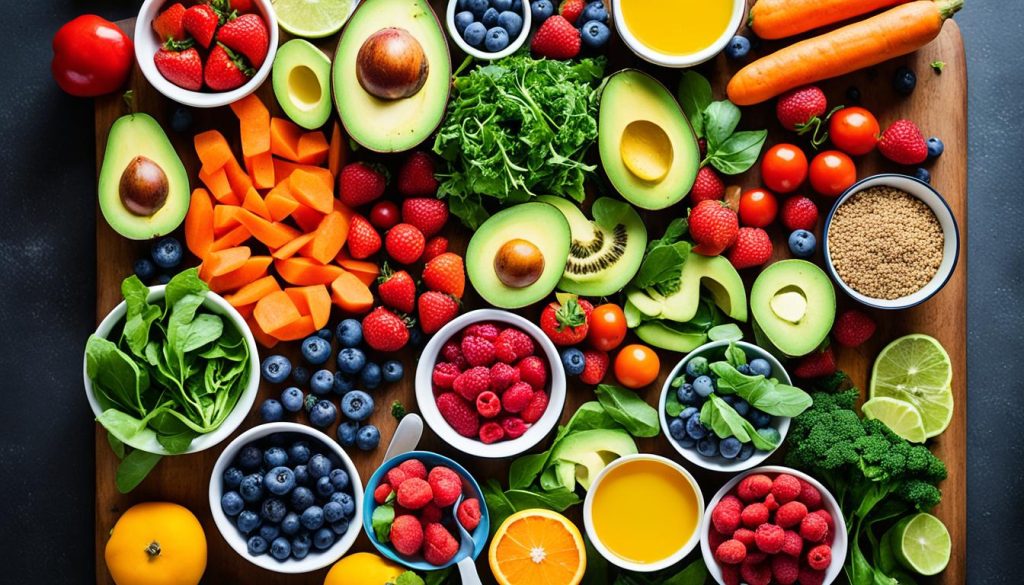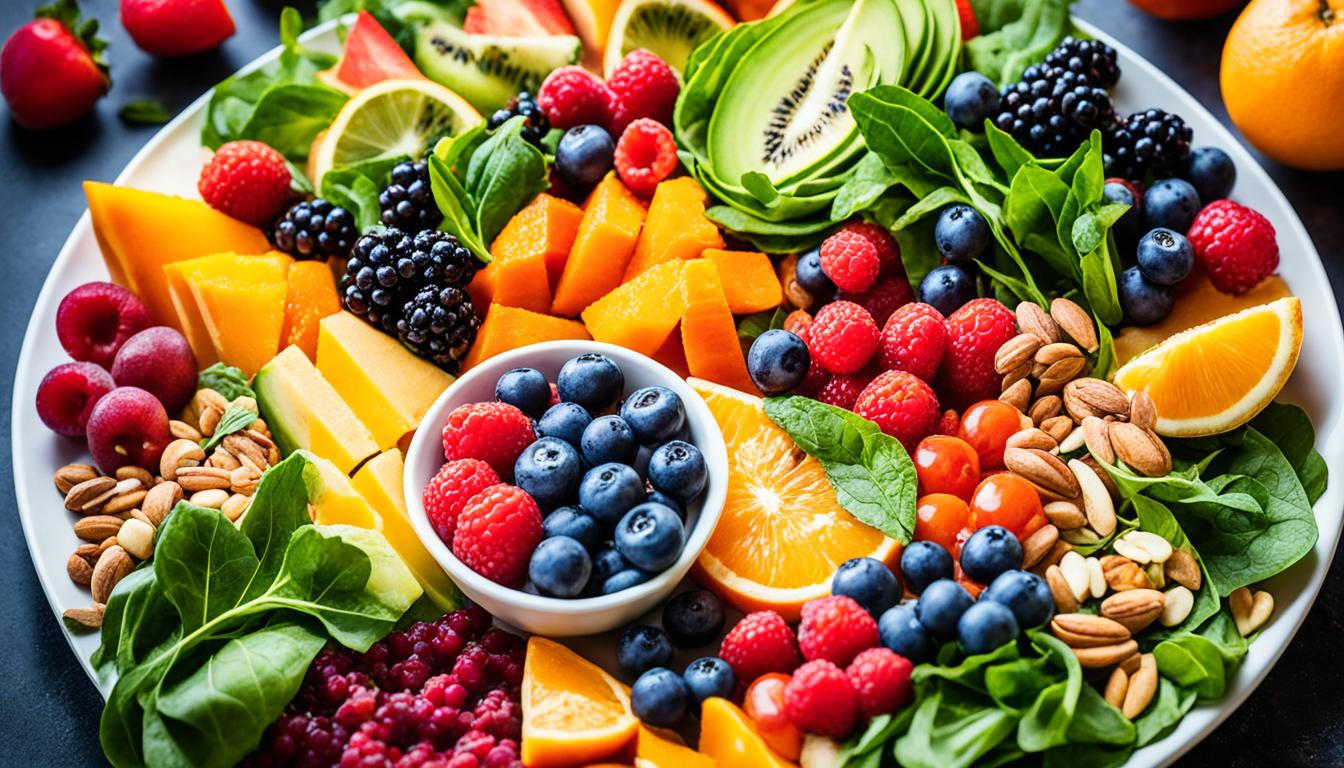Did you know that only 1.5-2% of adults in the U.S. follow a vegan diet? This diet is more than just avoiding meat, dairy, and eggs. It’s about eating whole, unprocessed foods to help you lose weight naturally. People who choose a vegan lifestyle may also be protected from diseases like obesity, type 2 diabetes, and high blood pressure.
Want to know how to lose weight on a vegan diet? It’s all about creating a calorie deficit. Cutting 500-1000 calories a day can lead to weight loss without missing out on nutrition. Vegan diets are low in saturated fats and cholesterol, which is good for your heart.
Eating plant-based foods is key to losing weight. Include foods like legumes, tofu, and nuts in your diet. Add some exercise, and you’ll not only lose weight but also improve your overall health. Start your plant-based weight loss journey and enjoy the benefits for your heart, waistline, and taste buds.
Quick Recommendation!!!! This blog only gives tips on vegan dieting for weight loss,however if you want more insights for better practical results we recommend Custom Keto Diet.
Understanding the Vegan Diet Basics
Starting a vegan diet means more than just skipping animal products. It’s a big change that can help you lose weight and get healthier. At its heart, a vegan diet is full of fresh fruits, veggies, beans, legumes, plant milks, and meat substitutes. These foods are key for staying balanced and are some of the best vegan foods for weight loss. They are low in calories but high in fiber, which helps you feel full and eat less.
Even without meat, dairy, eggs, and honey, veganism offers many tasty options. You’ll find a world where the best vegan foods for weight loss also make your meals fun and tasty. Foods like broccoli, spinach, lentils, and chickpeas fill you up and give you important nutrients. These nutrients help prevent shortages of vitamin B-12 and protein, which vegans might face.

If you’re new to veganism or want to improve, here are some tips for losing weight. Plan your meals well to get the right mix of nutrients. Always check nutritional labels when you shop. Eating fortified foods or supplements regularly is a good idea to avoid shortages of vitamin D, B12, and iron. This careful planning is important for your health, weight loss, and energy.
In conclusion, starting a vegan diet can change your life for the better. With good meal planning and focus on nutrition, the best vegan foods for weight loss will keep you full and help you reach your health goals. Every step you take towards understanding and following these vegan diet basics is a step towards a healthier life.
The Role of Protein in Vegan Weight Loss
Adding high-protein vegan foods to your diet is key for many health benefits. These include keeping muscle mass up and feeling full, which helps control how many calories you eat. Plant-based proteins support your metabolism and make you feel satisfied for longer, which is great for weight management.
High-protein foods like tofu, lentils, and chickpeas are important in a vegan diet for weight loss. These foods are crucial for making meals that are both nutritious and help you lose weight. For example, lentils give you about 12 grams of protein per 1/2 cup, making them a great choice for your meals.

Health experts say adults need 10% to 35% of their daily calories from protein. This means about 0.8 grams of protein per kilogram of body weight. So, a 160-pound person would need around 58 grams of protein a day. This can be easily met with a well-planned vegan diet.
Choosing a mix of high-protein vegan foods does more than just meet your protein needs. It also makes your diet richer in essential nutrients. Foods like seitan and soy products have all the amino acids your body needs, which is important for vegans.
Quick Recommendation!!!! This blog only gives tips on vegan dieting for weight loss,however if you want more insights for better practical results we recommend Custom Keto Diet.
Adding these nutrient-rich, high-protein vegan foods to your diet helps you reach your weight loss goals and stay healthy. By focusing on plant-based proteins, you get many health benefits while sticking to a vegan diet.
How to Lose Weight on a Vegan Diet Without Feeling Deprived
Starting a plant-based weight loss journey doesn’t mean you have to miss out on tasty and filling meals. A vegan diet is full of fruits, vegetables, whole grains, and legumes. These foods are great for fiber and help with weight management. The focus is on adding fiber-rich plant foods that make you feel full.
A TikToker lost 40 pounds by eating an oil-free, vegan diet. She ate half her plate of non-starchy vegetables and the other half complex carbs. This helped her stay in a calorie deficit without feeling hungry.

Adding foods like potatoes to your diet can help with weight loss. They are filling and low in calories. Instead of fake meats, choose whole plant-based proteins like lentils, chickpeas, and tofu. These foods are nutritious and keep calories low.
Adding prebiotics and probiotics like sauerkraut, kimchi, and vegan yogurts can improve gut health. This is good for weight management.
Meal planning and preparation are key to a successful plant-based diet. Avoid high-calorie vegan foods like nuts and avocados. Start eating whole, minimally processed foods. Understanding the emotional side of eating helps make plant-based weight loss enjoyable and sustainable.
Focus on nutrient-dense foods to make sure each meal is satisfying and supports your weight loss goals. This way, you won’t feel like you’re on a restrictive diet.
Planning for Success: Vegan Weight Loss Recipes and Prep
Starting a vegan weight loss journey can change your life. The secret to success is good planning and prep. With the right vegan recipes and meal prep, you’re ready for sustainable weight management. Studies show a well-planned vegan diet helps with weight loss. But, it’s important to watch your nutrition for health benefits.
Meal prep lets you control your food and nutrients for weight loss. Imagine starting your day with Apple-Cinnamon Overnight Oats or having a Roasted Veggie & Tofu Brown Rice Bowl for lunch. These meals are tasty and give you the nutrients you need to stay energized.

Batch cooking is a great way to keep a healthy vegan diet. Cooking big batches at the start of the week means you always have healthy meals ready. For example, vegan banana bread can be a quick breakfast or a cozy snack. It’s a tasty way to stick to your diet without spending a lot of time cooking.
It’s also important to eat a variety of foods to get all the nutrients you need. This includes things like iron and calcium, which vegans might miss out on. By choosing ingredients like legumes and plant-based milks, your meals will help you lose weight and stay healthy.
Successful vegan weight loss is about picking the right foods and preparing them in a way that fits your life. With these recipes and techniques, you’re on your way to reaching and keeping your weight loss goals in a healthy, fun, and lasting way.
Vegan Food Swaps to Accelerate Weight Loss
Starting a vegan diet for weight loss might seem hard, but making simple swaps can make it fun and effective. These changes help cut calories and add nutrients important for health.
Think about swapping high-calorie cheese in your salad with edamame or seeds. These options are lighter and full of protein and minerals. Edamame is a great protein source that keeps you full, helping you eat less. Seeds like flax, chia, or pumpkin add nutrients to your meals without extra calories.
For breakfast, skip traditional eggs and try ‘Just Egg’, a plant-based alternative. It’s similar in nutrition but safer for your heart. This change helps you follow a vegan diet for weight loss and makes mornings healthier.
Snacking on nuts and seeds is smart, according to a BMJ Nutrition & Prevention study. They’re high in fat and calories but don’t lead to weight gain. For dessert lovers, dairy-free ice cream is a lower-fat, lower-sugar option.
Using jackfruit instead of pulled pork is another great swap. Jackfruit is lower in calories but tastes like meat. Studies show it helps with weight loss and boosts health by lowering BMI, blood pressure, and cholesterol.
Adding these vegan swaps to your diet is more than just cutting calories. It’s about making changes for long-term health. Eating whole, unprocessed foods ensures a diet rich in nutrients, aiding weight loss and overall health.

Maintaining a Balanced Diet: The Nutrients Vegans Need
When you focus on vegan nutrition, it’s key to know the essential nutrients for vegans that animal products provide. As you start veganism, learning about these nutrients and their sources is crucial. It helps you keep a diet that’s both healthy and satisfying.
Protein is vital for fixing and building muscles. While meat is a top source, vegans can get plenty from legumes, nuts, seeds, and soy products. It’s important to watch your protein intake to meet your body’s needs.
Quick Recommendation!!!! This blog only gives tips on vegan dieting for weight loss ,however if you want more insights for better practical results we recommend Custom Keto Diet.
Vitamin B12 is mainly found in animal foods, so vegans often need supplements. This vitamin is key for nerves, DNA, and red blood cells. Checking your B12 levels regularly can stop shortages that could cause anemia or harm your nerves.
Calcium and vitamin D are also important for vegans. Calcium is great for bones and can be found in fortified plant milks, juices, tofu, and leafy greens. Vitamin D comes from the sun and fortified foods, so taking supplements in the dark months helps keep bones and immune systems strong.
Iron from plants isn’t as easily absorbed as from meat. But, eating foods high in vitamin C can help with iron absorption. Regularly eating lentils, chickpeas, hemp seeds, and quinoa will help keep iron levels up.
Zinc and omega-3 fatty acids are crucial for a strong immune system and a healthy brain. You can find zinc in whole grains, legumes, nuts, and seeds. Omega-3s are in flaxseeds, chia seeds, and walnuts.
Knowing about these nutrients and planning your meals can help you follow a balanced vegan diet. Eating a variety of plant-based foods and using supplements when needed makes sure you get all the essential nutrients for vegans.
The Long-Term Sustainability of a Vegan Weight Loss Diet
Starting a vegan diet for weight loss is more than losing weight. It’s about living a lifestyle that supports sustainable weight loss and many health benefits. This diet is full of nutritious foods that help with weight control and improve health. It’s packed with fiber, antioxidants, and important nutrients like potassium, magnesium, and vitamins A, C, and E. These help with metabolism and weight loss.
One big plus of the long-term vegan diet benefits is keeping a healthy weight over time. Vegans usually have a lower BMI than non-vegans because their diet is lower in calories but rich in nutrients and fiber. Research shows that a vegan diet can lead to losing about 13 lbs in 16 weeks. It also helps keep that weight off, proving it’s effective compared to other diets.
But, keeping weight off on a vegan diet requires careful nutrition to avoid missing out on vitamin B12, iron, and omega-3 fatty acids. These nutrients are harder to get from plants. Getting enough of these nutrients, possibly with supplements, is key to keeping the health perks of a vegan diet.
Adding regular exercise to a vegan diet brings even more benefits. This lifestyle change can lower the risk of diseases like type 2 diabetes, some cancers, and heart disease. Staying active makes a vegan diet a complete way to improve health and well-being.
With careful planning and a focus on getting a variety of nutrients, choosing to go vegan can be a lasting choice. It’s not just about managing weight but also boosting overall health. Plus, it’s good for the planet, making it a smart choice for your health and the environment.
Conclusion
A vegan diet for weight loss is more than a trend; it’s a lifestyle change with big health benefits. It requires learning about nutrition and can change lives. Studies show that eating plant-based can lower cholesterol and help with weight loss.
For example, one study found people on this diet lost about 12.8 pounds. This is better than traditional diets. Eating more plants and less meat is good for losing weight and keeping the heart healthy. It also lowers the risk of chronic diseases.
Quick Recommendation!!!! This blog only gives tips on vegan dieting for weight loss, however if you want more insights for better practical results we recommend Custom Keto Diet.
Research proves a vegan diet is very effective for losing weight. It’s even 197% better than some other diets. With obesity being a big health problem in the U.S., a vegan diet could be a key solution. Choosing a vegan lifestyle can improve your health, help the environment, or support animal welfare. It could be the next step to a healthier you.
